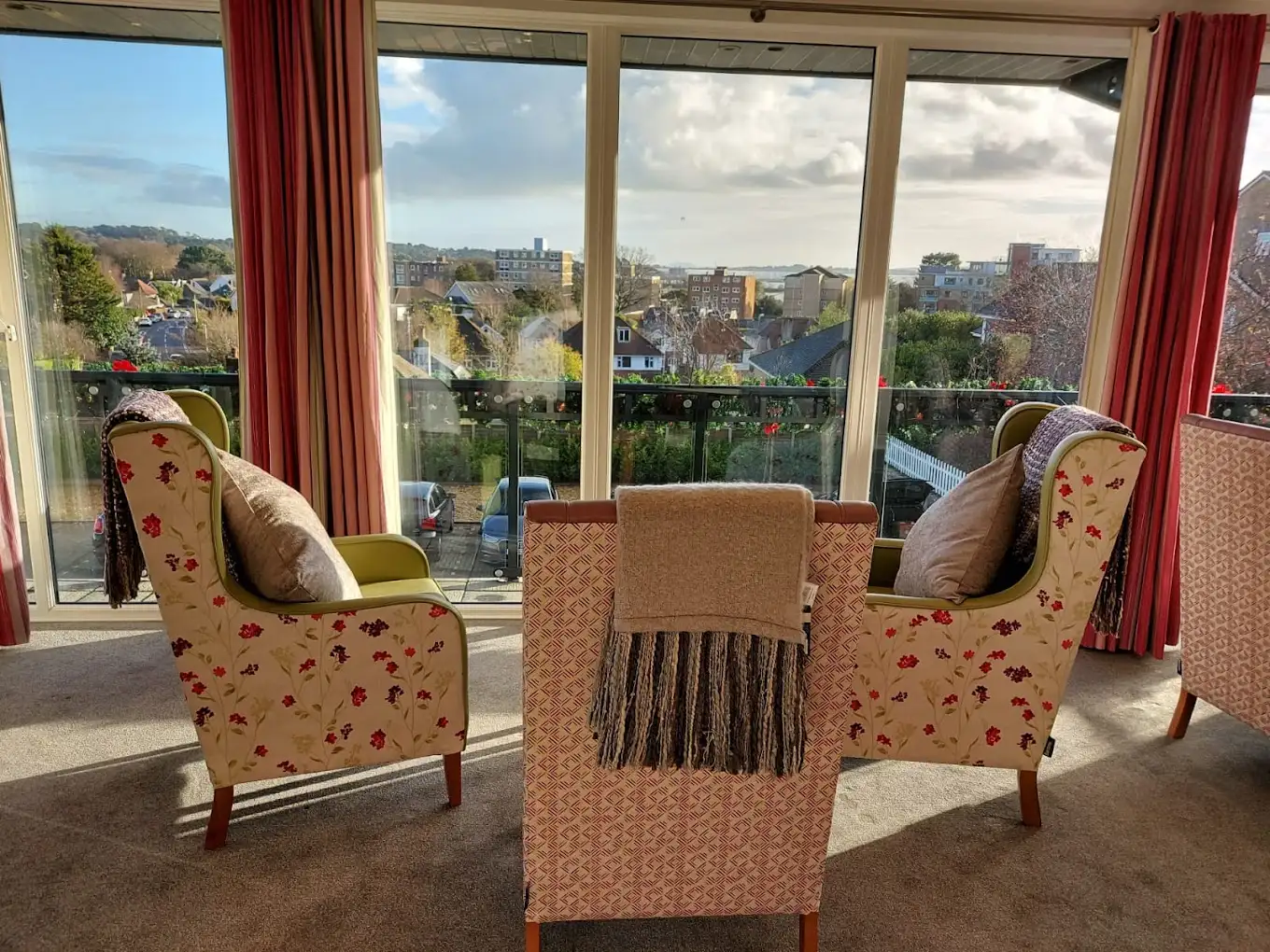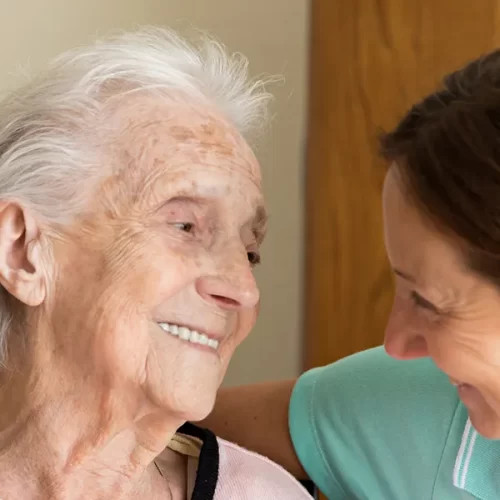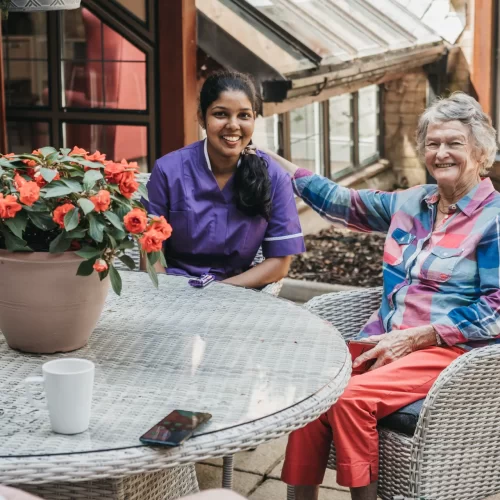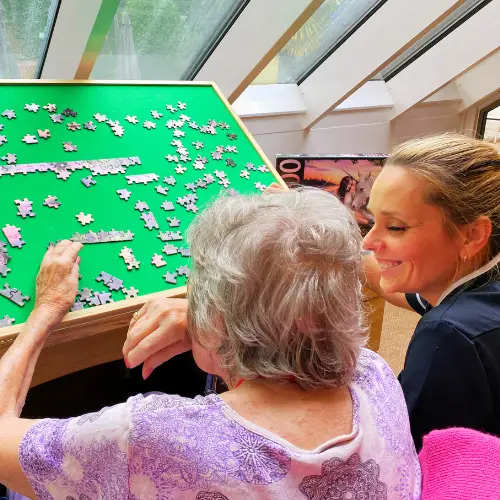How to Make the Most of Your Visit to a Loved One With Dementia

Visiting a parent, relative, or friend with dementia is a rewarding experience – you get to enjoy each others’ company, take part in fun activities, and make new memories together. Unfortunately, it can also bring challenges as their cognitive abilities change. To get the most out of your visit, it’s helpful to plan ahead and be ready for whatever may come up.
With six care homes and hundreds of residents, the LuxuryCare team have plenty of experience helping families navigate visits with their loved ones. Read on for our tips to help you make the most of your time together.
Before Your Visit
1. Set Realistic Expectations
Before visiting your loved one, it’s helpful to understand the different stages of dementia and how they can affect behaviour. Dementia impacts memory, cognition, and mood, so depending on the stage, your loved one may not remember past events or even recognise you. Still, your presence can provide them with comfort.
Instead of dwelling on what they used to be able to do, focus on being present in the moment. Enjoy whatever connection you can make, whether it’s through a smile, a conversation, or simply sitting quietly together.
2. Timing Is Important
The timing of your visit is also important. Many people with dementia have better mental clarity at certain times, often in the morning, so it’s a good idea to ask caregivers for advice on when to visit. It’s also usually best to keep visits short and frequent, as longer visits can sometimes be overwhelming for someone with dementia.

During Your Visit
1. Prepare Yourself Emotionally
It’s normal to feel sadness, frustration, or a sense of loss during a visit. Acknowledge those feelings, but try to stay positive to help create a calm and comforting environment. Patience is key – your loved one may repeat questions or stories, or get frustrated easily, so be prepared to respond with kindness.
2. Communicate the Right Way
Depending on the stage of dementia your loved one is in, you may need to adjust how you communicate to make it easier for them to understand. Here are some good approaches:
- It’s helpful to focus on the present, as they may struggle to recall past events. Talk about things happening in the moment, like the weather, the flowers outside, or how they’re feeling.
- If they say something that doesn’t make sense or remember something inaccurately, avoid correcting them. Redirect the conversation to avoid frustration.
- While short-term memory may be affected, long-term memories often stay intact for longer. You can still reminisce about things they might remember, such as childhood experiences or favourite hobbies.
- Don’t forget about non-verbal communication – people with dementia often respond to body language and tone of voice more than words. A smile, eye contact, or a gentle tone can convey reassurance.
- Physical touch, like holding hands or offering a gentle hug, can also be soothing and help create a sense of connection.
3. Engage Through Activities
Having an activity to do together can make visits feel more natural, giving you both something to focus on. Here are some ideas:
- Create a box of old photos or memorabilia that might bring back pleasant memories. Even if briefly, this can help them connect with their past.
- If they enjoyed hobbies like gardening, knitting, or art, try a simplified version of these activities. For example, you could sort gardening tools or do some light drawing together.
- Music, especially from their earlier years, can be incredibly comforting and may trigger memories. You might sing familiar songs or play their favourite tunes.
- If your loved one is in a care facility, ask the staff if you can join in on any activities they’re offering that day.
4. Respect Their Autonomy
Whenever possible, give your loved one simple choices, like which music to listen to or which activity to do. Even if the options are limited, it helps them maintain a sense of independence and dignity. It shows that their preferences still matter and allows them to stay involved in their own life.
Keep the choices straightforward and manageable, as too many options can be overwhelming. Instead of asking, “What would you like to do today?” you could offer two or three specific suggestions, like, “Would you like to listen to music or look through old photos?” This way, they can still make a decision without feeling confused or pressured.
5. Pay Attention to Their Cues
Dementia can make it harder for your loved one to manage their emotions, and they may get overwhelmed or tired more easily than before. If they become upset or fatigued, it’s perfectly okay to cut the visit short or switch to something more calming, like listening to soothing music, sitting quietly together, or taking a short walk. Sometimes just moving to a quieter spot or offering a gentle touch can make a big difference.

After Your Visit
1. Leave on a Positive Note
If your loved one gets upset when it’s time to leave, try to take a gentle approach. You may not need to make a big announcement – sometimes it’s easier to quietly slip away after saying a simple goodbye.
It’s natural to feel sad after the visit, but try to focus on the meaningful moments, no matter how small. Every smile, shared memory, and moment of connection is important.
2. Seek Professional Support
If your loved one is in a care facility, it might be helpful to talk to the staff about how to interact with them. They might have some ideas about what your loved one likes or how they’re behaving when you’re not there. You could also connect with other people who have loved ones with dementia in the facility or online. They might offer comfort, new ways to engage, and emotional support.
Expert, Compassionate Care for Dementia at LuxuryCare
Visiting someone with dementia can be difficult, but it’s a beautiful opportunity to share love and support. By focusing on the positive and being patient, you can create lasting memories together.
Is your loved one in need of dementia care in a beautiful setting? LuxuryCare offers personalised, high-quality care in Bournemouth and Poole. Our team has over 20 years of experience providing compassionate support for individuals with dementia. From residential care to specialised nursing, we’re here to help. Book a viewing online or call us on 01202 037373 today.















